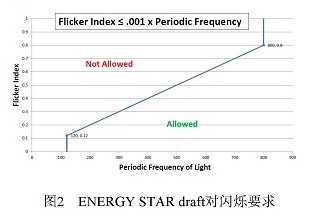The LED stroboscopic effect actually have two concepts: One is strobe which mean the depth of light flux fluctuations, the more violent fluctuation, the depth of strobe more lager. Second is stroboscopic effect which mean the human visual produce negative effects of electric light flicker, the more violent fluctuation, the negative effects more lager, the damage will be more bad. The flicker and stroboscopic effect have direct relationship with electric light source types and technical performance. The different types and different technical performance of electric light source decided the flicker and stroboscopic effect level is different.
We just talked about the LED solid lighting product’s flicker and stroboscopic effect, many people have no idea about this. The light source flashing is directly expression of luminous flux fluctuation, the light source is driving by AC current and pulsed DC current, luminous flux, illuminance or brightness change accordingly with the current amplitude of cyclical change. Normally, according to human eyes feeling, the flicker divided into visiable Flicker and Invisible Flicker. When the frequency more than 100Hz, the human eyes can’t feeling the flicker, but it will cause eyestrain, headache etc, this is the flash effect, generally agreed that the flicker effect exists within 500Hz. For this issue, America Energy Star(ENERGY STAR lamps V1.0 draft 4 In the dimming performance requirements specified in the blink Conditions to be fulfilled, use all tools). As below figure:

The Method of Measuring LEDs and LED Luminaires Flicker
Light source flashing allowed range:
1、 Frequency less than 100Hz;
2、 Within 120Hz-800Hz frequency range, the F1<0.001 X frequency;
3、 Frequency more than 800Hz, F1 have no requirements;
4、 Frequency is uncertain, PF<30%.
Besides, the CFL lamp output frequency range should at 20-30KHz, or more than 40KHz.
The nature of light source flicker is luminous flux output fluctuations. When measuring light fluctuates with time change, not only the brightness curve can be tested, but also can test luminous flux curve or illumination curve which are under the same conditions. ENERGY STAR(V1.0)make the rules to measuring flicker’s requirements:
1、 Power and instrumentation are need meet the requirements of LM-79-08;
2、 Multi-channel oscilloscope with memory function, necessary need to add attenuation probe. The sampling rate is more than 2kHz, the sampling time is more than 100ms;
3、 Photo detector V(入) Correction, and need meet the requirements of the corresponding time;
4、 For the absolute value of the metering(absolute photometry): Need use integrating sphere when measuring of the absolute value; For relative value metering(relative photometry): To ensure that the detector is capable of measuring the relative light output, and only receives light from the light source to be measured.
Before measuring, the CFL lamps need light on 100 hours at least and it’s need preheat before testing. LED lamp needn’t lighting on, the environmental temperature range should at 25+/-5 degrees.
To meet EU ErP rules and Energy Star requirements, Lisun developed LSRF-2 Lamp Start, Run-up time and Flicker Test System. The hardware of this system included PH3000 Transient Photometer, LSP-500VAC Programmable AC Power Source Meter, IS-MA series Integrating Sphere, DC3005 DC Power Source and SLS series Standard Lamp; the software of this system included LST-3000 Lamp Start and Run-up Time Test and FLK-3000 Lamp Flick Test. PH3000 Transient Photometer is developed base on rapid sampling techniques, it’s fully meet EU and Energy Star relevant requirements. Combined with computer, it can measuring and record the fast change luminous flux waveform and others parameters. PH3000 applied with 12 Bytes, the maximum sampling rate of 10M Hz high-speed A / D. The PH3000 also can used as common illuminometer which can be widely used in light flux, brightness, illumination, etc. photometric detection and measurement. LSP-500VAC Programmable AC Sine Wave Power Source is a high-power, low pure sine wave distortion, high stability, integrated power supply source table, it’s especially suitable for as test power supply of electronic ballasts, energy saving lamps and other small power household appliances. And this system also included IS-1.5MA Integrating Sphere, DC3005 DC Power Source and SLS-50W Standard Light Source.
Tags:LMS-6000 , LSRF-2 , LSRF-3Your email address will not be published. Required fields are marked *